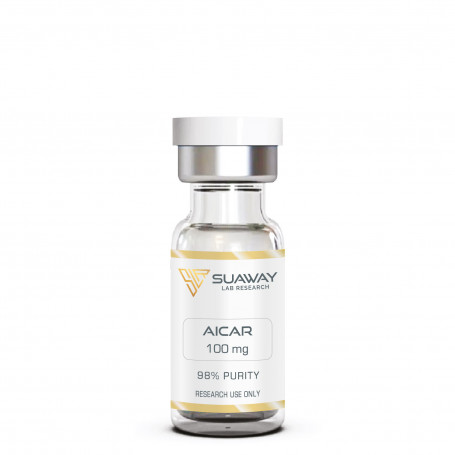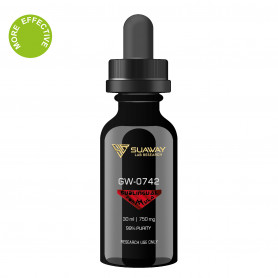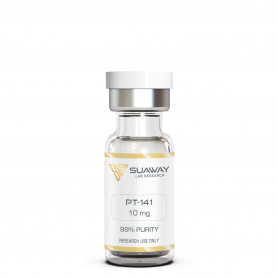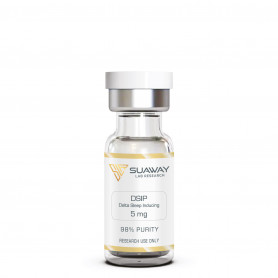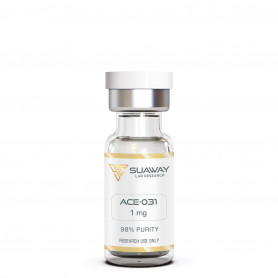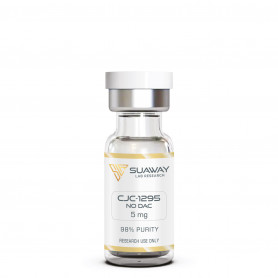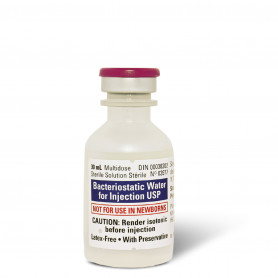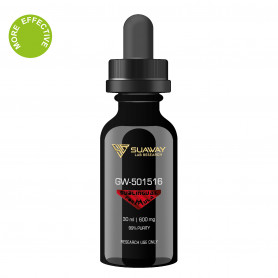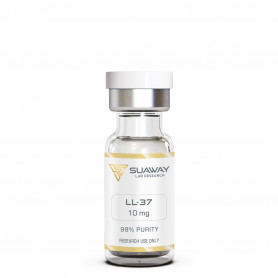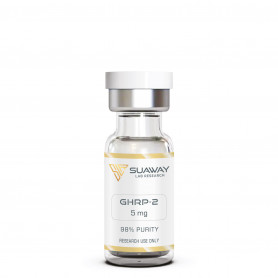AICAR - 100mg
Adenosine monophosphate has an equivalent in the molecule known as AICAR. In clinical studies, it has been found to reduce the risk of cardiac ischemia occurring after a prior heart attack. Due to its antioxidant characteristics, AICAR may aid in reducing the physiologic effects of ageing. The use of AICAR reduce the consequences of diabetes, autoimmune illnesses, and other inflammatory conditions.
Beschreibung
STRUCTURE
Sequence: 5-aminoimidazole-4-carboxamide ribonucleoside
Molecular Formula: C9H15N4O8P
Molecular Weight: 338.213 g/mol
CAS Number: 3031-94-5
Peptide purity: greater than 98%
Other details: No TFA Salt, No Mannitol
Storage: Lyophilized peptide must be stored at -20°C and peptide solution at +4°C.
AICAR has low oral and excellent subcutaneous bioavailability.
DESCRIPTION
AICAR, also known as 5-aminoimidazole-4-carboxamide ribonucleoside, is a short peptide that is involved in many metabolic processes and energy homeostasis. AICAR controls how muscle cells respond to insulin and how insulin receptors are regulated. The anti-cancer effects of AICAR and its capacity to safeguard heart and circulatory tissue are both actively being studied. An AMP kinase (AMPK) activator is AICAR.
The therapy for acute lymphoblastic leukaemia now utilizes a chemical known as AICAR, which is an activated version of the naturally occurring compound acadesine. According to research, acadesine, like AICAR, has anti-cancer qualities. Additionally, it has been discovered to contribute to the inhibition of platelet activity, hence preventing the onset of blood clotting.
According to studies done on mice, AICAR may decrease inflammation in adipose tissue even at low dosages. Even without affecting body weight, lowering inflammation improves glucose homeostasis and increases insulin sensitivity in fat, which is linked to increased insulin resistance. It seems that AICAR impacts inflammation in adipose tissue via a number of different routes, at least one of which involves SIRT1 and macrophages.
It is not surprising that AICAR has an effect on adipose inflammation. In both healthy and diabetic mice, AMPK has been shown to reduce inflammatory responses in metabolic diseases. In studies using mice, it was shown that AICAR-induced AMPK activation enhances insulin sensitivity, energy balance, lipid metabolism, and inflammatory markers.
Muscle cells have more GLUT-4 insulin receptors on their surface as a result of exercise. It is one of the best ways to increase muscle cells' ability to absorb glucose and significantly lowers blood sugar levels and insulin resistance. It becomes found that repeated administration of AICAR has effects comparable to long-term exercise and that AICAR accurately replicates the effects of exercise.
AMPK has a complicated involvement in the development and spread of cancer, both delaying and speeding up tumour growth depending on the situation. Overall, the evidence points to the fact that prolonged enzyme activation ultimately kills cancer cells by slowing their metabolism and making them more vulnerable to environmental stresses. Both in rats and in cell culture, this has been proven. Researchers are examining how well AICAR may increase the efficacy of other chemotherapy drugs by collaborating with them. The idea is that AICAR could:
- Lessen adverse effects
- Permit lower chemotherapeutic drug dose
- Improve cancers that are resistant to chemotherapy
According to studies done on thyroid cancer cells, AICAR may also function via inducing apoptosis (programmed cell death). The eventual activation of caspase 3 and the generation of p21 accumulation seem to be the mechanisms by which this action is mediated. The overall result is a reduction in cancer cell survival and growth.
At the cellular level, AMPK activators have been demonstrated to be crucial in inflammation. Metformin is a well-known and widely-used diabetic treatment, and research suggests that at least some of the drug's effectiveness stems from its ability to lower inflammation and improve pancreatic function. Similar effects are produced by AICAR, which acts as a protective factor in inflammatory diseases such acute lung injury, asthma, colitis, atherosclerosis, and hepatitis.
The use of AICAR to mitigate the impact of autoimmune disorders and other inflammatory illnesses is still being studied. For instance, research on mice suggests that ACIAR may be useful in lowering colitis inflammation. By lowering NF-kappaB activation in macrophages as well as TH1- and TH17-type cytokines, it seems that AICAR functions as a key inhibitor of immunological responses in this situation.
Heart disease and inflammation are closely associated. Controlling inflammation may slow the development of vascular disease, including atherosclerosis. AICAR was shown to decrease the growth of vascular smooth muscle in rabbit atherosclerosis models. This is a crucial aspect of cardiovascular disease and a contributing factor in the long-term failure of cardiac stents. Without the use of medications that raise the risk of bleeding, controlling vascular inflammation may lessen both short- and long-term consequences after stent installation.
Additionally, studies show that activating AMPK might reduce certain immunological responses that result in atherosclerosis. The accumulation of LDL, sometimes known as "bad cholesterol," promotes the growth of macrophages. The development of plaques that may potentially result in heart attacks depends on this process. Anything that may stop this growth has the potential to lower the prevalence of heart disease and even heart attacks.
The capacity of the peptide to enhance sperm motility, energy metabolism, and fertilising ability has been the focus of much AICAR research. Researchers have shown that AMPK activators like AICAR may enhance sperm motility by enhancing energy metabolism in cats, goats, and chickens. It seems that AICAR controls the energetic enzyme activity in spermatozoa, which affects overall fertilising capacity.
REFERENCES
N. Jessen et al., “Effects of AICAR and exercise on insulin-stimulated glucose uptake, signaling, and GLUT-4 content in rat muscles” [PubMed]
M. Igata et al., “Adenosine monophosphate-activated protein kinase suppresses vascular smooth muscle cell proliferation through the inhibition of cell cycle progression” [PubMed]
K. Pan et al., “AMPK activation attenuates inflammatory response to reduce ambient PM2.5-induced metabolic disorders in healthy and diabetic mice” [PubMed]
A. Bai et al., “Novel anti-inflammatory action of 5-aminoimidazole-4-carboxamide ribonucleoside with protective effect in dextran sulfate sodium-induced acute and chronic colitis” [PubMed]
M. M. H. Yung et al., “Targeting AMPK signaling in combating ovarian cancers: opportunities and challenges” [PubMed]
Z. Yang et al., “The full capacity of AICAR to reduce obesity-induced inflammation and insulin resistance requires myeloid SIRT1" [PubMed]
DISCLAIMER
This product is intendend for lab research and development use only. These studies are performed outside of the body. This product is not medicines or drugs and has not been approved by the FDA or EMA to prevent, treat or cure any medical condition, ailment or disease. Bodily introduction of any kind into humans or animals is strictly forbidden by law. This product should only be handled by licensed, qualified professionals.
All product information provided on this website is for informational and educational purposes only.

